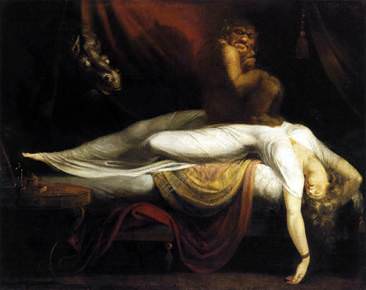Hello everyone. I am an aspiring curator for the Romanticism Gallery. Here are three different pieces of Romantic work which I would like to share with you -
Music:
Richard Wagner’s Ride of the Valkyries (1851) –
“Ride of the Valkyries” is a very popular opera by
Richard Wagner that was composed during the Romantic Era. When I first listened to this piece, I did
not think of it to be a Romantic piece because it sounded to me to be very
modern with the overall usage of the different instruments. When I looked at the year that it was
composed, I could not believe it because I thought it was so ahead of it’s
time! Some words that came to my mind
were adventure, epic, heroic, etc. This
is definitely a strong Romantic piece as it reflects a very controversial theme
that was taking place back in this period.
Since the Romantic Era was a very revolutionary time period where many
people rebelled against tradition and authority, Nationalism was very common.
This was often presented in the form of folk music and was used to
convince and motive citizens into confiding in their nation with the idea that theirs
was the greatest of any other nation, and this was taking place all around the
world. Not only this, but many Romantic
songs also had incorporation's of Nordic mythologies, such as this one! The title of this opera makes reference to
the Valkyries, female figures in Norse mythology of which many died during
battle.
Art:
Fuseli’s Nightmare (1781) –
This painting done by Henry Fuseli is definitely a
strong piece that is a representation of work created during the Romantic era. This painting clearly contains the theme of The Dark Side and the Supernatural,
which were some of the many popular aspects that were developed during this
time period. The supernatural element
was a new motif of art where artists could apply their creative imaginations in
a way that aspects that were not able to be seen by the human eyes, could now
be contrasted with the natural world. In
this painting, there is a bright woman who is sleeping, while there are two Gothic figures watching over her. Both grotesque
figures, of the dark horse and the goblin, add to the uncomfortable tone are
reflective of the title of Fuseli’s piece: Nightmare.
Poetry:
Wordsworth’s Lines written a Few Miles above Tintern
Abbey (1798) –
Visit this side to see the lyrics: http://www.blupete.com/Literature/Poetry/WordsworthTinternAbbey.htm
Something that is very
interesting about literature, especially poetry, is that it can have many
interpretations. When I read the lyrics
to the poem “Lines Written a Few Miles above Tintern Abbey” by William Wordsworth,
I couldn’t help but to notice myself feeling very calm and relaxed, in
comparison to seeing Fuseli’s Nightmare art piece. This poem, just like the other two works, is
also representative of Romanticism, as it deals with the theme opposite of the
supernatural. During the Romantic era, Nature was a source of inspiration for
many artists and allowed them to use it to symbolize beauty, as well as for the
contemplation of philosophical ideas. In
this poem, Tintern Abbey (great ruins in Wales) is used as an extended metaphor
for the time passing in one’s life.
There are not only many references to natural images, but there are many
words in the poem that make reference to the occurrence of time. For example: Five years have past. As years and season pass by, the Tintern
Abbey becomes old as does the narrator.
The tone that is created through the natural imagery in this poem is
very liberating!
Below is a picture of Tintern Abbey!




